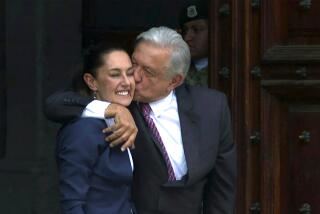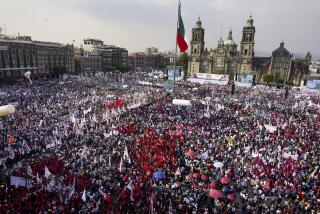Mexico’s Ruling Party Prepares to Elect Leader
- Share via
MEXICO CITY — Mexico’s long-ruling Institutional Revolutionary Party geared up Thursday to elect its leader for the first time, following the surprise resignation of its powerful chief.
The outgoing leader, Mariano Palacios Alcocer, said the March 30 vote by a party council is aimed at increasing democracy within the party, known as the PRI. In the past, the Mexican president appointed the PRI’s chief and its presidential candidate in a process known as the dedazo, or big finger.
Now, both top party figures will be chosen by vote. Wednesday night’s announcement produced skepticism among some analysts, who questioned whether the election for PRI chief would represent real change in the party that has dominated Mexican politics for 70 years.
“There’s no doubt it’s a presidential dedazo. It’s just not as primitive as in the past,” said Alfonso Zarate, editor of a political newsletter here.
He noted that, as soon as Palacios resigned Wednesday night, many party leaders trooped to the office of Labor Minister Jose Antonio Gonzalez Fernandez, apparently tipped off that he was the favorite of President Ernesto Zedillo.
Gonzalez announced Thursday that he will step down as labor minister to compete for the PRI leadership. Candidates have until Monday to register for the election.
Rumors had flown for months that the current PRI leader would step down. Analysts said that, since his appointment in September 1997, Palacios had failed to heal splits between the party’s old-guard politicians and the “technocrats” loyal to Zedillo.
“The perception was that Palacios Alcocer wasn’t strong enough to reconcile the differences between the politicos and the tecnicos, between the president and the more rebellious wings of the party,” said Delal Baer, a Mexico expert at the Center for Strategic and International Studies in Washington.
The divisions have sharpened as the PRI prepares for what could be the most competitive presidential election ever, to be held next year. Many believe that the ruling party could even split apart over the choice of its presidential candidate.
While many considered that Palacios’ days were numbered, the timing of the resignation stunned the PRI. Members of the party’s largely ceremonial Political Council had been summoned Wednesday night to receive an outline of the party’s plan to hold presidential primaries. Instead, they were informed that they would vote on the PRI chief’s replacement in the next few days.
In an unprecedented move, the council rebelled, demanding more time for the vote.
“This decision should be discussed and analyzed in the whole country,” declared Sen. Amador Rodriguez Lozano, one of several speakers in what amounted to the Political Council’s first debate ever. “We should show that our party is not afraid of democracy.”
In the end, the party leadership agreed to extend the sign-up period for candidates from two to five days and allow a secret vote by the council’s 370 members.
Analysts noted that the election would still be quick. Some said that indicated Zedillo wanted to impose a new party leader and not permit time for a truly democratic exercise.
“These guys [Palacios and his team] resigned because Zedillo told them to resign, and Zedillo will pick the new candidate,” political scientist Jorge Castaneda said.
But others said that even an election featuring a clear favorite was more democratic than an outright presidential appointment.
The surprise resignation raised speculation that Palacios may have been ousted after running into difficulties in organizing the presidential primaries. Zedillo suggested earlier this month holding a two-step process, with state primaries followed by a national convention. But the party has issued no specifics on the procedure, which is expected later this year.
The election of the PRI leader comes as Mexico’s two main opposition parties are also changing their chiefs. PRI officials said privately that they hoped their election would contrast favorably with the vote held Sunday by the left-wing Democratic Revolution Party. That party’s nationwide polling of militants has been marred by charges of disorganization and fraud.
More to Read
Sign up for Essential California
The most important California stories and recommendations in your inbox every morning.
You may occasionally receive promotional content from the Los Angeles Times.










